
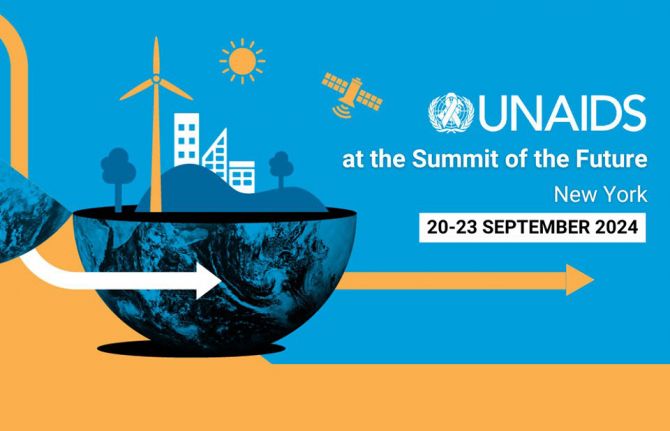


Press Release
Young people living with HIV urge world leaders to partner with them in the AIDS response
19 September 2024 19 September 2024NEW YORK/GENEVA, 19 September 2024—With support from UNAIDS, two young social media influencers living with HIV are on their way to the United Nations General Assembly and the Summit of the Future in New York to urge world leaders to partner with them in the response to HIV. Ibanomonde Ngema from South Africa and Jerop Limo from Kenya will call on leaders to invest in youth-friendly health systems, provide holistic services for young people living with HIV, and to partner with young people and communities, allowing them to lead in the response to HIV.
“Young people’s powerful and vibrant activism has driven so much of the progress made in the HIV response,” said Winnie Byanyima, Executive Director of UNAIDS. “They know what works for them. It is essential for leaders to listen to them to understand the specific challenges that young people face and how those challenges can be overcome. Leaders can only successfully plan how to end AIDS and sustain the advances made by partnering with young people living with HIV.”
“I am representing not only the voices of 1.5 million Kenyans living with HIV but all people living with HIV,” said Jerop Limo, a young Kenyan HIV activist. “I want leaders to leave New York knowing that we are not beneficiaries, we are equal rights holders. We have a voice, we have skills and expertise and we need an equal playing field where our data is valued, where our input is valued and where our voices are heard. We want meaningful and ethical engagement of adolescents and young people in all spaces of the AIDS response.”
Young people, especially adolescent girls and young women, are disproportionately affected by HIV. Globally, 44% of all new HIV infections were among women and girls (all ages) in 2023 and every week 4000 young women and girls around the world are infected with HIV—3100 are in sub-Saharan Africa. In 2023, some 3.1 million adolescents and young people (15-24 yrs) were living with HIV—1.9 million were adolescent girls and young women.
“Governments meeting here in New York cannot end AIDS alone. They need to involve us to find solutions. We have lived experiences of HIV, from treatment to mental health, because we navigate life with HIV every day. We need to be included in policymaking so that we can take full ownership of ending end AIDS as a public threat,” said Ibanomonde Ngema, a young South African AIDS activist. “The world can only benefit when young people are included in the global HIV response. No conversation about HIV should take place without us, from policy to practice in communities.”
Too often young people report facing stigma and discrimination, including from doctors and healthcare workers, when they access sexual and reproductive health and HIV services. This discourages them from seeking support and crucial information about their health, putting them at risk of HIV infection or of defaulting on treatment for those who are living with HIV.
Involvement of young people in the HIV response
Young people living with HIV play a critical role in the fight against AIDS in communities. They offer support and share important information about HIV that schools or parents might not talk about. They also challenge stigma and discrimination through social media, helping to save lives and encourage young people to stay on treatment.
They drive innovation in communities, for example, a self-funded project by the Youth Empowerment Group uses e-bikes to deliver antiretroviral medicines, food and adherence support to young people who often cannot attend clinics because their schooling hours conflict with clinic opening times in Namibia.
However, their transformational work is being held back because it is not being sufficiently supported. Youth-led HIV responses often operate with little or no financial and political support. At the UNGA the two young people will call on world leaders to fully support and fund their work. They will also urge leaders to uphold the human rights of young people as key to ending AIDS as a public health threat—they will call on them to protect young people’s right to healthcare, education, freedom of speech, and to provide social support to young people living with HIV.
“Providing treatment is not enough, young people living with HIV need an education and they need a job to survive,” added Jerop Limo. “We need to be seen as equal contributors and partners, and we need investment to allow us drive change. We are the leaders of the future and we need to be included now to help shape a better future for us all.”
UNAIDS
The Joint United Nations Programme on HIV/AIDS (UNAIDS) leads and inspires the world to achieve its shared vision of zero new HIV infections, zero discrimination and zero AIDS-related deaths. UNAIDS unites the efforts of 11 UN organizations—UNHCR, UNICEF, WFP, UNDP, UNFPA, UNODC, UN Women, ILO, UNESCO, WHO and the World Bank—and works closely with global and national partners towards ending the AIDS epidemic by 2030 as part of the Sustainable Development Goals. Learn more at unaids.org and connect with us on Facebook, Twitter, Instagram and YouTube.

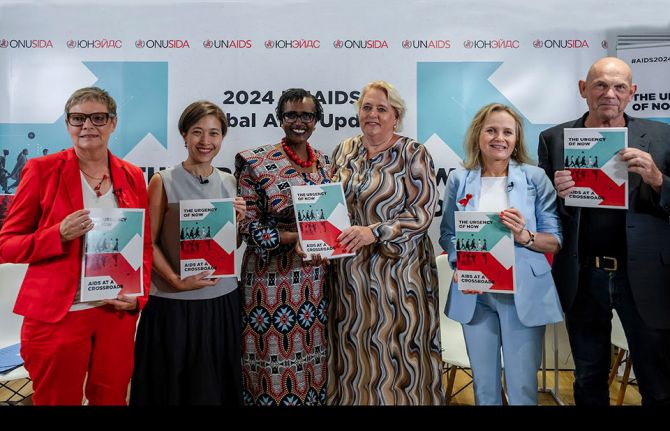
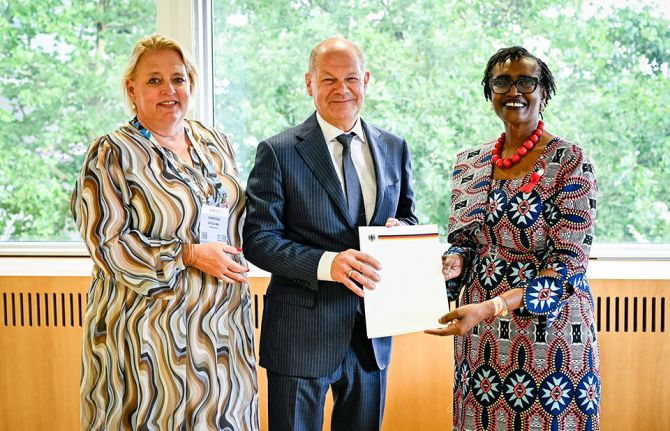
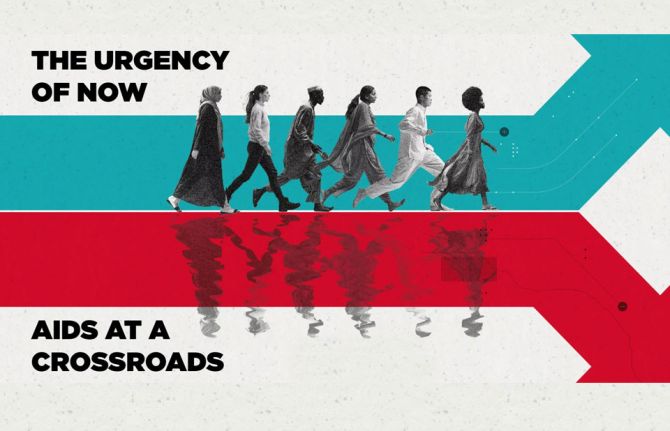
Press Release
UNAIDS urges leaders to ‘act now’ to overcome the world’s deadliest pandemic at AIDS 2024
26 July 2024 26 July 2024GENEVA/MUNICH, 26 July 2024—At the 25th International AIDS Conference (#AIDS2024), UNAIDS urged all participants to stay committed because the end of AIDS is within grasp. UNAIDS called on leaders to embrace new scientific developments to prevent HIV, ensure that the work to end AIDS is fully resourced, and to ‘stand for justice’ to end harmful laws preventing people from accessing lifesaving HIV services.
On the first day of the conference, UNAIDS released a new report, ‘The Urgency of Now: AIDS at a Crossroads’ showing that the decisions taken by world leaders this year will decide the fate of millions of people and determine whether world leaders will meet their commitment to end AIDS as a public health threat by 2030. Data from the report was used to highlight this critical message in sessions and plenaries throughout the conference.
At the opening ceremony, the Executive Director of UNAIDS Winnie Byanyima set a tone of determination and collective action saying, “The path that ends AIDS is well sign-posted, it is proven and it has been promised. Success or failure will be determined by which path leaders take today. Let us continue walking the path of solidarity, together and with urgency.”
A major focus of the conference was on lenacapavir, an injectable medicine taken once every six months which has shown in trials to be 100% effective in preventing HIV. UNAIDS called the new drug a ‘game-changer’ and urged manufacturer Gilead to make it affordable and available as soon as possible to the millions of people who could benefit from it.
“We still have 1.3 million new HIV infections per year. We want this 'miracle' prevention drug to reach all those who need it, now - not in 6 years!” said Ms Byanyima. “Gilead needs to move quickly to license lenacapavir to generic producers. Generic producers bring the price down and serve all countries where the majority of people who are at risk live.”
UNAIDS called for equity and human rights, engaging discussions on reducing stigma and discrimination, and ensuring human rights for all people affected by HIV, particularly the most marginalized and the most vulnerable to HIV including women and girls, men who have sex with men, sex workers and people who use drugs.
Echoing this call the German Chancellor Olaf Scholz said, “What we really have to keep working on is the fight against discrimination and stigma. This applies to each and every individual living with HIV.” He added, “Every single person must be protected – no matter where they come from, no matter how healthy they are, no matter who they love.”
He announced that Germany would be joining the UNAIDS Global Partnership for Action to Eliminate all Forms of HIV-related Stigma and Discrimination and that Germany would ‘continue to be a reliable partner to UNAIDS’.
UNAIDS also highlighted the leadership role communities play in reaching people with HIV services and countries to ensure that community organizations are fully engaged, fully funded and have a seat at the table in all decision-making processes affecting people living with and at risk of HIV.
Across, the conference programme, UNAIDS collaborated with PEPFAR on the shared priorities in the AIDS response, as we work together to accelerate toward 2030 and sustain the gains beyond. UNAIDS is grateful to Ambassador Nkengasong for his continued leadership and partnership in the response to HIV.
This year's conference, which took place in Munich, Germany from 22-26 July 2024, brought together 15 000 global leaders, scientists, advocates, and communities under the theme Put People First! to advance progress towards the shared global goal of ending AIDS by 2030.
Winnie Byanyima expressed her gratitude to all participants and reaffirmed UNAIDS' commitment to ending AIDS. "This conference has been a testament to the power of unity, innovation, and resilience. Together, we have made significant strides, and we leave Munich with renewed energy and determination to achieve our goal of ending AIDS by 2030," said Ms Byanyima.
UNAIDS
The Joint United Nations Programme on HIV/AIDS (UNAIDS) leads and inspires the world to achieve its shared vision of zero new HIV infections, zero discrimination and zero AIDS-related deaths. UNAIDS unites the efforts of 11 UN organizations—UNHCR, UNICEF, WFP, UNDP, UNFPA, UNODC, UN Women, ILO, UNESCO, WHO and the World Bank—and works closely with global and national partners towards ending the AIDS epidemic by 2030 as part of the Sustainable Development Goals. Learn more at unaids.org and connect with us on Facebook, Twitter, Instagram and YouTube.
Video playlist
Multimedia assets for share
Data on HIV

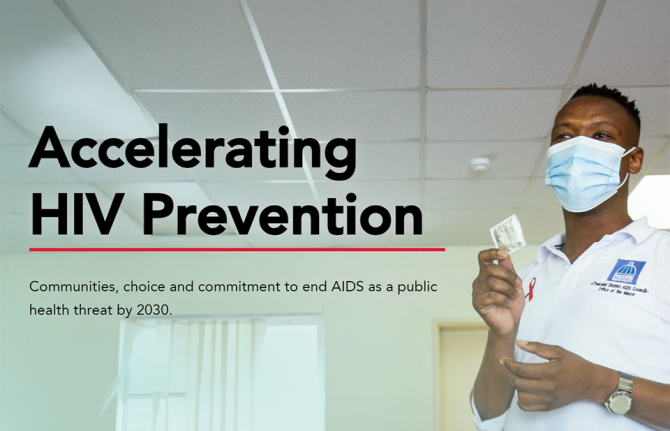
Press Release
With new HIV infections rising in a growing number of countries and regions, urgent action is needed to turn the prevention crisis around
24 July 2024 24 July 2024GENEVA/MUNICH, 24 July 2024—An estimated 1.3 million people became infected with HIV in 2023, three times more than the target of fewer than 370 000 by 2025. While there has been marked progress in sub-Saharan Africa, for the first time, in 2023 more than half of the new HIV infections occurred outside of sub-Saharan Africa.
Rising new HIV infections are evident in several countries, particularly in countries where key populations including men who have sex with men, sex workers, transgender people and people who use drugs, are most affected, and investment in prevention was lower. Key populations and their sexual partners now represent the majority (55%) of new HIV infections globally, up from 44% to 2010.
The Global HIV Prevention Coalition (GBC), established in 2017, is addressing the HIV prevention crisis. Focusing on 40 countries the GPC, a coalition of United Nations Member States and partners including UNAIDS, donors, civil society and private sector organizations, is working to strengthen and sustain political commitment for HIV prevention.
“The HIV epidemic has evolved – now more than ever, we need resilient capacity to deliver and manage integrated, differentiated and equitable HIV prevention interventions,” said Prof. Sheila Tlou, GPC Co-chair and Former Minister of Health, Botswana.
There has been great variation in progress among GPC member countries; the biggest declines occurred in countries within eastern and southern Africa including Kenya, Malawi and Zimbabwe, where new HIV infections were reduced by more than 66% and which are on track to achieve the global target of 90% reduction by 2030 – and, to a lesser extent, in western and central Africa. Expansion of access to effective HIV treatment, combined with an ongoing focus on primary prevention, are driving those achievements.
“The moment of opportunity for HIV prevention is now,” said Angeli Achrekar, UNAIDS Deputy Executive Director for Programmes. “Today, we have a wider range of prevention options including new long-acting antiretroviral prevention—with the new results about lenacapavir—a twice yearly injection to prevent HIV—providing a promising game-changing option—and new opportunities to communicate about HIV prevention and health.”
Long-acting technologies like pre-exposure prophylaxis (PrEP) will play a major role in preventing new infections in the coming years. Access is increasing, but only in a few countries. Around 3.5 million people were accessing PrEP (antiretroviral medicine which prevents HIV) in 2023 up from just 200 000 in 2017, but this remains far short of the 10 million target set for 2025.
New HIV prevention products in the pipeline such as long-acting injectable cabotegravir (CAB-LA) and most recently, lenacapavir, are raising expectations due to their combination of convenience and high efficacy. However, the key is accessibility and affordability. The cost of the new long-acting injectable PrEP options, and the speed with which they are made available to potential users in the countries with the most need will be critical in expanding access to these life-saving technologies.
Persistent gaps remain in HIV prevention coverage (only 61% of areas with high incidence of HIV have programmes for young women, less than half of sex workers, and only about a third of gay men and other men who have sex with men and people who inject drugs regularly access prevention in GPC focus countries).
Condoms remain the most effective low-cost HIV prevention tool, however global condom procurement or distribution in low- and middle-income countries declined by an average of 27% between 2010 and 2022 and procurement by major donors fell by an average 32% in that period. Socially marketed distribution declined from a peak of about 3.5 billion condoms in 2011 to about 1.8 billion in 2022.
Condoms, PrEP, post exposure prophylaxis, antiretroviral therapy to ensure viral suppression thus preventing transmission of the virus, harm reduction and voluntary medical male circumcision are all HIV prevention options that should be real choices available for people at risk of HIV infection. Addressing structural and gender inequalities faced by these priority and key populations is essential in ensuring access to prevention services. The urgency to secure and sustain gains for HIV prevention cannot be overemphasized – programmes need to be community-led and country-led.
“No matter how good the science or community leadership, HIV will not end unless we have significant policy change to reverse criminalization and lessen stigmatization of affected populations. If we can’t protect human rights, then we can’t end HIV. This is never just about the virus—it’s about people, and the people must lead,” said Mitchell Warren, GPC co-chair and Executive Director, AVAC.
An enormous unmet need for resources for HIV prevention and societal enabler programmes in almost all regions persists. An estimated US$ 2.4 billion was available for primary prevention programmes in low- and middle-income countries in 2023 compared to the estimated need of USD 9.5 billion in 2025. Investing in HIV prevention now is essential to scale up programmes.
If 1.3 million people continue to acquire HIV every year, the response will become more challenging, more complex and more costly in 2030 and 2050. Increased investments in HIV prevention, strengthened political leadership, enabling legal and policy environments are urgently needed to effectively implement programmes. The time to act is now!
UNAIDS
The Joint United Nations Programme on HIV/AIDS (UNAIDS) leads and inspires the world to achieve its shared vision of zero new HIV infections, zero discrimination and zero AIDS-related deaths. UNAIDS unites the efforts of 11 UN organizations—UNHCR, UNICEF, WFP, UNDP, UNFPA, UNODC, UN Women, ILO, UNESCO, WHO and the World Bank—and works closely with global and national partners towards ending the AIDS epidemic by 2030 as part of the Sustainable Development Goals. Learn more at unaids.org and connect with us on Facebook, Twitter, Instagram and YouTube.
Our work


Press Release
Stigma, criminalization and under-investment are driving worrying rises in new HIV infections in Eastern Europe and Central Asia
22 July 2024 22 July 2024MUNICH, 22 JULY 2024 – A new United Nations report released today shows that the HIV response in Eastern Europe and Central Asia is critically off track. Data in UNAIDS’ global report The Urgency of Now: AIDS at a Crossroads reveals that in this region, new HIV infections have risen by 20% and AIDS-related deaths have risen by 34%, since 2010. Only half of the 2.1 million people living with HIV in the region are accessing treatment, and only 42% of all people living with HIV in the region have suppressed viral load, the lowest rate globally. The report shows that it is still possible to end AIDS as a public health threat by 2030, but only if governments reform laws to protect everyone’s human rights and increase resources to ensure services are available for all.
“The promise to end AIDS is off track in Eastern Europe and Central Asia. But leaders can get on the path that ends AIDS. Programmes need to focus especially on people most affected by HIV, who are often the most marginalized and vulnerable. Community organizations need to be properly funded, supported and enabled to provide HIV services to people affected by HIV. The barriers of stigma and discrimination need to be broken down,” said Winnie Byanyima, UNAIDS Executive Director.
The new data shows that in 2023, there were 140,000 new HIV infections across the region, with 93% occurring in Russia, Ukraine, Uzbekistan, and Kazakhstan. Eight out of 13 countries in the region reported increases in new infections.
Because stigma, discrimination and harmful punitive laws obstruct marginalised communities’ access to vital services, 94% of new infections were among people from key populations - including men who have sex with men, people who inject drugs, and sex workers - and the sexual partners of people from key populations. Only 58% of sex workers, 43% of gay men, 52% of people who inject drugs, and 65% of transgender people receive HIV prevention services. Only 12% of resources are dedicated to prevention programmes for key populations.
The criminalization of small amounts of drug possession for personal use, of sex work, and of HIV transmission and exposure, are driving the people most in need underground and out of reach of HIV services. All 16 countries in the region criminalize sex work, 13 criminalize the non-disclosure, exposure, or transmission of HIV, and 7 criminalize small amount of drug possession for personal use. Studies show criminalization increases HIV prevalence among key populations. Unless countries can ensure fear-free access to HIV prevention services for everyone, new infections will continue to grow.
“Restrictive legal environments and stigma are obstructing progress in the region,” said Eamonn Murphy, UNAIDS Regional Director for Eastern Europe and Central Asia and Asia Pacific. “Restrictive laws, along with aggressive policing and stigma, push people away from medical care. If people are pushed underground, the HIV response will not succeed.”
Powerful prevention technologies like PrEP are also not widely accessible for the same reason. Criminalization fuels stigma, with many avoiding medical care due to discrimination. Nearly half of people surveyed who inject drugs in Kyrgyzstan and 32% of people living with HIV in Tajikistan reported avoiding medical care due to stigma and discrimination. UNAIDS data shows that people in key populations are experiencing high levels of violence.
"Supporting the leadership of communities is essential for reaching marginalised people providing vital outreach services. Without community leadership and the integration of community services into the health system, reaching these groups is too difficult," said Yelena Rastokina, lead of the ‘Answer-Kazakhstan’ Association.
Recent years have seen worrying restrictions of civic space and limits to communities’ involvement in public health initiatives, including those related to harm reduction, access to public health services for LGBTQ+ people, sex workers and other marginalised people. Restrictive systems at local, national, and regional levels are holding back communities’ contribution to public health.
Ganna Dovbach, Executive director of the Eurasian Harm Reduction Association, highlighted: “The shrinking of civic space and attacks on human rights threaten our response to HIV, which is based on community-led or civil society provided services. Addressing these interconnected issues is essential for a sustainable response to the AIDS epidemic in our region.”
The region’s HIV response has also been hurt by the war in Ukraine.
But despite the conflict, Ukraine remains committed to its HIV response. Through a strong coalition of the government, civil society, international organizations and donors, HIV services have been maintained, with 143,600 people receiving treatment in 2023. This collaboration has ensured vital supplies of antiretroviral and tuberculosis medicine, and opioid agonist therapy, contributing to uninterrupted HIV treatment and other services. As of January 2024, 7,900 Ukrainian refugees in other countries and 1,900 returnees were accessing antiretroviral therapy.
Many community organizations working on HIV in Ukraine refocused their efforts to addressing humanitarian issues and supporting community members while continuing national advocacy for access to HIV services and the protection of human rights.
With support from the UNAIDS and other donors ALLIANCE.GLOBAL oversees a network of five specialized shelters across the country, providing shelter, humanitarian aid, and access to specialised services, including HIV prevention and treatment, for key populations and LGBTQ+ people who are internally displaced.
Despite the war, ALLIANCE.GLOBAL together with other community-led organisations continue advocating for laws that better protect LGBTQ+ people from intolerance and from hate crimes, to enhance access to public health services, including HIV-related services.
UNAIDS new report calls on leaders to develop sustainable plans for the HIV response to2030 and beyond. These plans should include enabling legal environments, support for community-led response and a boost in domestic funding. Repealing laws and norms that prevent people from accessing services is crucial.
“Ensuring access to services and treatment for all is how we end AIDS,” said Mr Murphy.
UNAIDS
The Joint United Nations Programme on HIV/AIDS (UNAIDS) leads and inspires the world to achieve its shared vision of zero new HIV infections, zero discrimination and zero AIDS-related deaths. UNAIDS unites the efforts of 11 UN organizations—UNHCR, UNICEF, WFP, UNDP, UNFPA, UNODC, UN Women, ILO, UNESCO, WHO and the World Bank—and works closely with global and national partners towards ending the AIDS epidemic by 2030 as part of the Sustainable Development Goals. Learn more at unaids.org and connect with us on Facebook, Twitter, Instagram and YouTube.
Region/country
- Eastern Europe and Central Asia
- Albania
- Armenia
- Azerbaijan
- Belarus
- Bosnia and Herzegovina
- Bulgaria
- Croatia
- Cyprus
- Czechia
- Estonia
- Georgia
- Hungary
- Kazakhstan
- Kyrgyzstan
- Latvia
- Lithuania
- Montenegro
- Poland
- Republic of Moldova
- Romania
- Russian Federation
- Serbia
- Slovakia
- Slovenia
- Tajikistan
- North Macedonia
- Türkiye
- Turkmenistan
- Ukraine
- Uzbekistan

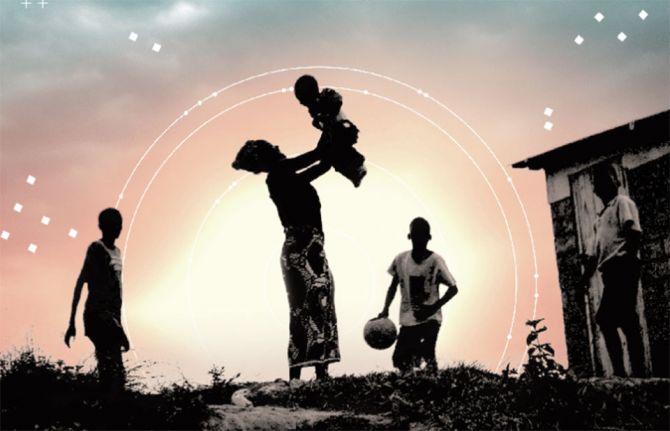
Press Release
Unfinished business: only the urgent and accelerated delivery of HIV services will keep the promise of ending AIDS in children by 2030
22 July 2024 22 July 2024Despite significant gains in many countries, critical gaps continue to undermine efforts to end AIDS in children
GENEVA/MUNICH, 22 July 2024—Despite progress made in reducing HIV infections and AIDS-related deaths among children, a new report released today by the Global Alliance for Ending AIDS in Children by 2030 shows that an urgent scale up of HIV services in countries worst affected by the pandemic is required to end AIDS by 2030.
The report, Transforming Vision Into Reality, shows that programmes targeting vertical transmission of HIV have averted 4 million infections among children aged 0-14 years old since 2000. Globally, new HIV infections among children aged 0-14 years old have declined by 38% since 2015 and AIDS-related deaths have fallen by 43%.
Among the 12 Global Alliance countries, several have achieved strong coverage of lifelong antiretroviral therapy among pregnant and breastfeeding women living with HIV, with Uganda nearing 100%, United Republic of Tanzania at 98%, and South Africa at 97%. Mozambique has achieved 90% coverage, with Zambia at 90%, Angola at 89%, Kenya at 89%, Zimbabwe at 88%, and Cote d'Ivoire at 84%.
“I applaud the progress that many countries are making in rolling out HIV services to keep young women healthy and to protect babies and children from HIV,” said UNAIDS Executive Director, Winnie Byanyima. “With the medicines and science available today, we can ensure that all babies are born – and remain – HIV-free, and that all children who are living with HIV get on and stay on treatment. Services for treatment and prevention must be ramped up immediately to ensure that they reach all children everywhere. We cannot rest on our laurels. The death of any child from AIDS related causes is not only a tragedy, but also an outrage. Where I come from, all children are our children. The world can and must keep its promise to end AIDS in children by 2030.”
Global Alliance countries are innovating to overcome barriers and accelerate progress towards ending AIDS in children. However, despite advances neither the world nor Global Alliance countries are currently on track to reach HIV-related commitments for children and adolescents and the pace of progress in preventing new HIV infections and AIDS-related deaths among children has slowed in recent years.
“Accelerating the delivery and uptake of HIV services for children and adolescents is a moral obligation, and a political choice,” said Dr Tedros Adhanom Ghebreyesus, Director-General of the World Health Organization. “Twelve countries are demonstrating they have made that choice, but significant challenges remain. While we have made progress in increasing access for pregnant women to testing and treatment to prevent vertical transmission of HIV, we are still far from closing the paediatric treatment gap. We need to further strengthen the collaboration and reach of the Global Alliance, and we must do this work with focus, purpose and in solidarity with all affected mothers, children, and adolescents.”
Around 120 000 children aged 0-14 years old became infected with HIV in 2023, with around 77 000 of these new infections occurring in the Global Alliance countries. AIDS-related deaths among children aged 0-14 years old numbered 76 000 globally with Global Alliance countries accounting for 49 000 of these unnecessary deaths. Vertical transmission rates remain extremely high in some locations, particularly in Western and Central Africa, with rates exceeding 20% in countries including Nigeria and the Democratic Republic of the Congo.
“In the fight against HIV, we must do a much better job for children,” said Peter Sands, Executive Director of the Global Fund to Fight AIDS, Tuberculosis and Malaria, which provides funding for HIV programmes in over 100 countries through a country-led partnership model. “In support of national programmes, we have been procuring the latest dolutegravir-based paediatric treatment regimens at negotiated prices. Our investments in laboratory systems are helping ensure exposed infants are rapidly tested and that those that test positive are quickly initiated on age-appropriate antiretroviral treatment. Differentiated testing and treatment approaches are helping close the diagnostic gap and ensuring more child-centred service delivery.”
It is concerning that the treatment gap between adults and children continues to widen.
“Just 57 per cent of children living with HIV receive life-saving treatment, compared to 77 per cent of adults,” said UNICEF Associate Director HIV/AIDS, Anurita Bains. “Without early and effective testing and treatment, HIV remains a persistent threat to the health and well-being of children and adolescents and puts them at risk of death. To close the treatment gap, we must support governments to scale up innovative testing approaches and ensure children and adolescents living with HIV receive the treatment and support they need.”
In 2023, there were 210 000 new infections globally among young women and girls aged 15—24 years old (130 000 in Global Alliance countries), four times higher than the 2025 goal set at 50 000. Preventing new infections among this age group is critical both to protect the health and wellbeing of young women and to reduce the risk of new infections among children.
Gender inequalities and human rights violations are increasing women’s vulnerability to HIV and diminishing their ability to access essential services. Globally, nearly one in three women have encountered some form of violence during their lifetime, with adolescent girls and young women disproportionately affected by intimate partner violence. In the four Global Alliance countries with available data, countries are not currently on track to achieve the target of ensuring that by 2025 less than 10% of women, key populations and people living with HIV experience gender-based inequalities and gender violence.
"It has been remarkable to see how many more children's lives can be saved when all stakeholders and partners come together to commit to end AIDS in children. While much progress has been made, notably through the successful introduction of pediatric dolutegravir, large gaps still remain across the pediatric cascade and we must recommit ourselves with purpose and innovation to fulfill the promises we have made by 2025 and beyond,” said Ambassador John N. Nkengasong, United States Global AIDS Coordinator and Special Representative for Global Health Diplomacy.
The Global Alliance for Ending AIDS in Children by 2030 was launched in 2022 by WHO, UNICEF and WHO to reinvigorate the paediatric HIV agenda. It has now grown, and in addition to the United Nations agencies, the alliance includes civil society movements, including the Global Network of People living with HIV, national governments in the most affected countries, and international partners, including PEPFAR and the Global Fund. Twelve countries are members: Angola, Cameroon, Côte d'Ivoire, The Democratic Republic of the Congo (DRC), Kenya, Mozambique, Nigeria, South Africa, Tanzania, Uganda, Zambia, and Zimbabwe.
UNAIDS
The Joint United Nations Programme on HIV/AIDS (UNAIDS) leads and inspires the world to achieve its shared vision of zero new HIV infections, zero discrimination and zero AIDS-related deaths. UNAIDS unites the efforts of 11 UN organizations—UNHCR, UNICEF, WFP, UNDP, UNFPA, UNODC, UN Women, ILO, UNESCO, WHO and the World Bank—and works closely with global and national partners towards ending the AIDS epidemic by 2030 as part of the Sustainable Development Goals. Learn more at unaids.org and connect with us on Facebook, Twitter, Instagram and YouTube.
Contact
UNAIDSMichael Hollingdale
hollingdalem@unaids.org
UNICEF
Lazeena Muna-Mcquay
lmunamcquay@unicef.org
WHO
Sonali Reddy
reddys@who.int
The Global Fund
Ann Vaessen
ann.vaessen@theglobalfund.org
PEPFAR
Veronica Davison
davisonv@state.gov

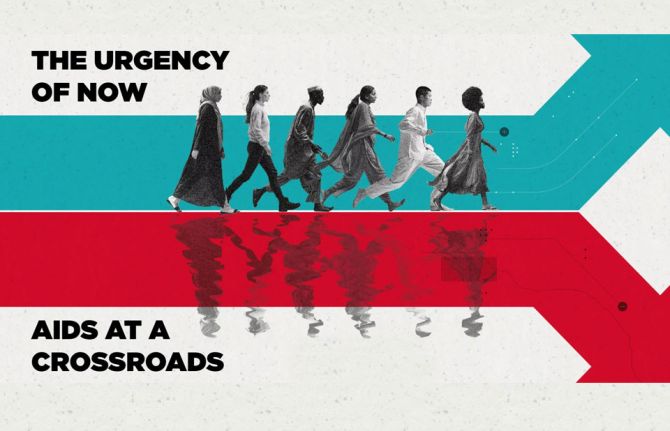
Press Release
New UNAIDS report shows AIDS pandemic can be ended by 2030, but only if leaders boost resources and protect human rights now
22 July 2024 22 July 2024GENEVA/MUNICH, 22 July 2024—A new report released today by UNAIDS shows that the world is at a critical moment that will determine whether world leaders meet their commitment to end AIDS as a public health threat by 2030. The report, The Urgency of Now: AIDS at a Crossroads, brings together new data and case studies which demonstrate that the decisions and policy choices taken by world leaders this year will decide the fate of millions of lives and whether the world’s deadliest pandemic is overcome.
Whilst the end of AIDS is within our grasp, this decade, currently the world is off track. Globally, of the 39.9 million people living with HIV, 9.3 million, nearly a quarter, are not receiving life-saving treatment. As a consequence, a person dies from AIDS-related causes every minute.
Leaders pledged to reduce annual new infections to below 370 000 by 2025, but new HIV infections are still more than three times higher than that, at 1.3 million in 2023. And now cuts in resourcing and a rising anti-rights push are endangering the progress that has been made.
“World leaders pledged to end the AIDS pandemic as a public health threat by 2030, and they can uphold their promise, but only if they ensure that the HIV response has the resources it needs and that the human rights of everyone are protected,” said UNAIDS Executive Director, Winnie Byanyima. “Leaders can save millions of lives, prevent millions of new HIV infections, and ensure that everyone living with HIV can live healthy, full lives.”
The report finds that if leaders take the bold actions needed now to ensure sufficient and sustainable resourcing and protect everyone’s human rights, the number of people living with HIV, requiring life-long treatment, will settle at around 29 million by 2050 but if they take the wrong path, the number of people who will need life-long support will rise to 46 million (compared to 39.9 million in 2023).
The report shows continued (although slower) progress in rolling out medicines to people living with HIV with 30.7 million people now on treatment, more than 3 in 4 people living with HIV. As recently as 2010 treatment coverage stood at just 47%. The expansion of people accessing treatment is a landmark public health achievement that has seen AIDS-related deaths halved since 2010—from 1.3 million to 630 000 in 2023.
However, the world is off track to meet the 2025 target of reducing AIDS-related deaths to below 250 000.
Although tremendous progress has been made in preventing new HIV infections which have fallen by 39% since 2010 globally, and by 59% in eastern and southern Africa, the report shows that new HIV infections are rising in three regions, the Middle East and North Africa, Eastern Europe and central Asia and Latin America, and gaps and inequalities persist.
“Countries are making enormous progress to end the AIDS epidemic by 2030, however there have been many challenges that could slow our efforts,” said Dr Anthony Fauci, Former Scientific Advisor to the US President. “We must do everything we can to be continually vocal and proactive. Failure is not an option here. In fact, it is unthinkable. If we all work together, we shall meet our common goal. I for one will continue to work with all of my strength to make sure that we do indeed end the AIDS epidemic and I implore all of you to commit to the same.”
Gender inequality is exacerbating the risks faced by girls and women and driving the pandemic. HIV incidence among adolescent girls and young women is still extraordinarily high in parts of eastern and southern Africa and western and central Africa.
Because stigma and discrimination against marginalized communities create barriers to vital prevention and treatment services, key populations, including sex workers, men who have sex with men and people who inject drugs, represent an increased proportion at (55%) of new infections globally compared to 2010 (45%).
The report demonstrates that HIV prevention and treatment services will only reach people if human rights are upheld, if unfair laws against women and against marginalized communities are scrapped, and if discrimination and violence are tackled head on.
UNAIDS calculations show that whilst 20% of HIV resources should be dedicated towards HIV prevention for populations most affected by HIV, just 2.6% of total HIV spending went towards interventions for key populations in 2023.
Around the world funding is shrinking, holding back progress and even leading to rising epidemics in certain regions. In 2023, total resources available for HIV (US$ 19.8 billion) dropped by 5% from 2022 and were US$ 9.5 billion short of the amount needed by 2025 (US$ 29.3 billion). Domestic funding in low- and middle-income countries—which make up 59% of total resources for HIV—is being constrained by the debt crisis and fell for the fourth consecutive year, with a 6% decline from 2022 to 2023.
Increased resource mobilization is needed, especially in Asia and the Pacific—where the numbers of people living with HIV are projected to almost double by 2050—and in Eastern Europe and Central Asia, Latin America and the Middle East and North Africa, regions with growing epidemics, but where funding for HIV has decreased significantly. Around half of the total resources needed by 2025, and 93% of the current HIV funding gap, are outside of sub-Saharan Africa.
The Urgency of Now: AIDS at a Crossroads shows that decisions taken this year will determine if global targets are met, AIDS is ended as a public health threat by 2030, and a sustainable HIV response is built.
“The fraying of solidarity between and within countries is putting progress in danger, but the path that ends AIDS is a path that has been proven, and is a path that leaders have promised to take. Whether leaders fulfill their pledge to end AIDS is a political and financial choice. The time to choose the right path is now,” said Ms Byanyima.
Video playlist
Report launch
UNAIDS
The Joint United Nations Programme on HIV/AIDS (UNAIDS) leads and inspires the world to achieve its shared vision of zero new HIV infections, zero discrimination and zero AIDS-related deaths. UNAIDS unites the efforts of 11 UN organizations—UNHCR, UNICEF, WFP, UNDP, UNFPA, UNODC, UN Women, ILO, UNESCO, WHO and the World Bank—and works closely with global and national partners towards ending the AIDS epidemic by 2030 as part of the Sustainable Development Goals. Learn more at unaids.org and connect with us on Facebook, Twitter, Instagram and YouTube.
Microsite
Data on HIV
Executive summary
Video playlist

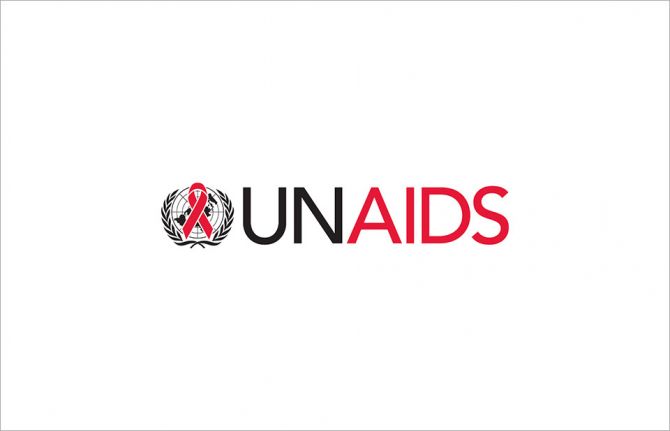
Press Release
UNAIDS welcomes the adoption of a key HIV resolution by the Human Rights Council
12 July 2024 12 July 2024GENEVA, 12 July 2024— UNAIDS welcomes the adoption, by consensus, of a critical resolution on human rights in the context of HIV and AIDS at the 56th session of the UN Human Rights Council.
The 2024 resolution 56/20 Human Rights in the Context of HIV and AIDS, recognizes the centrality of human rights to the HIV response. The resolution reaffirms that, “the full realization of all human rights and fundamental freedoms for all is an essential element in the global response to the HIV epidemic and its sustainability.”
It also recognizes the importance of human rights and community leadership in the HIV response, ensuring access to available and affordable HIV prevention, testing and treatment services for all, without discrimination. The resolution also calls on countries to tackle discriminatory attitudes and punitive laws and policies that prevent access to health services and to support community-led organizations as well as protect civic space.
This ground-breaking text includes the first unqualified recognition of sexual and reproductive health and rights in a UN resolution and calls on countries to scale up comprehensive education on sexual and reproductive health with information on, “sexuality and comprehensive HIV prevention, gender equality and women’s and girls’ empowerment, human rights, and physical, psychological and pubertal development, to enable them to build self-esteem and risk reduction skills and to empower them in their decision-making, communication and development of respectful relationships, in order to enable them to protect themselves from HIV infection.” .
Every week, 4000 adolescent girls and young women (aged 15–24 years) became infected with HIV worldwide. 3100 of these infections occurred in sub-Saharan Africa, also where 6 out of 7 new HIV infections in adolescents (aged 10–19 years) were among girls.
UNAIDS Executive Director, Winnie Byanyima said, “We would not be where we are today in the HIV response, with 29 million people on treatment and a 56% reduction in new HIV infections, without having human rights and communities at the center of the response. However, the status quo is not enough. All stakeholders need to scale up action to respect, protect and fulfil human rights in the HIV response if we are to end inequalities and end AIDS for everyone.”
Human Rights Council members expressed concern that key populations face multiple and intersecting forms of discrimination, stigma, violence and abuse. This affects their access to clinics and/or peer-led drop-in centers and called on member states to take action to ensure access to non-stigmatizing health services free from discrimination and legal barriers.
The resolution recognizes the importance of the Global AIDS Strategy’s societal enabler targets and calls on countries to take action to remove punitive legal and policy frameworks, and end stigma. This also includes addressing gender-based violence and inequalities, as well as changing gender stereotypes and negative social norms.
The societal enabler targets, outlined in both the 2021 Political Declaration on HIV and AIDS and the Global AIDS Strategy, 2021-2026, commit countries to the following targets: that by 2025, less than 10% of people living with HIV and key populations experience stigma and discrimination, less than 10% experience gender-based inequalities and violence and less than 10% of countries have punitive laws and policies.
Progress towards the 2025 milestone has been mixed, with many countries failing to make significant progress required to be on track to meet these targets and other human rights goals.
This resolution is an important commitment by countries to re-double their efforts to ensure human rights are at the center of a sustainable HIV response.
Going forward the resolution calls on OHCHR and UNAIDS, in collaboration with other stakeholders to hold a panel at the 58th session of the Human Rights Council in 2025 to discuss the realization of human rights in sustaining and increasing the gains made in the HIV response. The session will include recommendations to countries and will be followed by a report on sustainability and human rights to be presented at the 60th HRC session.
In 2025, countries are set to develop a new Global AIDS Strategy that will take the world to the 2030 deadline to meet the Sustainable Development Goals, which includes ending AIDS as a global health threat by 2030.
UNAIDS commends the leadership of Brazil and the other members of the core group, Colombia, Portugal and Thailand, for continuing to lead the resolution on HIV at the Human Rights Council and their significant success in bringing consensus back to this relevant resolution.
More information here: OHCHR | 56th regular session of the Human Rights Council: Resolutions, decisions and President’s statements
UNAIDS
The Joint United Nations Programme on HIV/AIDS (UNAIDS) leads and inspires the world to achieve its shared vision of zero new HIV infections, zero discrimination and zero AIDS-related deaths. UNAIDS unites the efforts of 11 UN organizations—UNHCR, UNICEF, WFP, UNDP, UNFPA, UNODC, UN Women, ILO, UNESCO, WHO and the World Bank—and works closely with global and national partners towards ending the AIDS epidemic by 2030 as part of the Sustainable Development Goals. Learn more at unaids.org and connect with us on Facebook, Twitter, Instagram and YouTube.

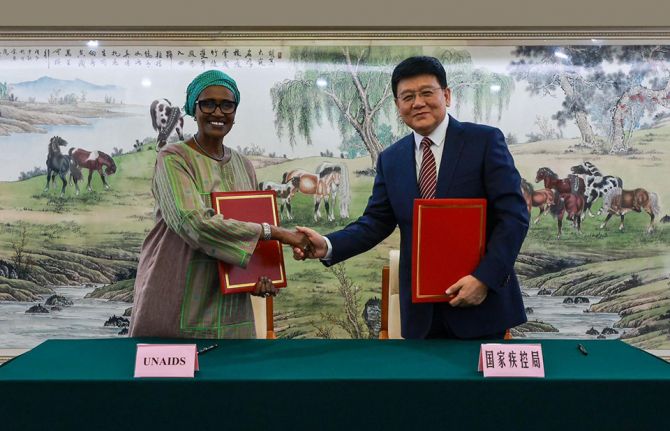
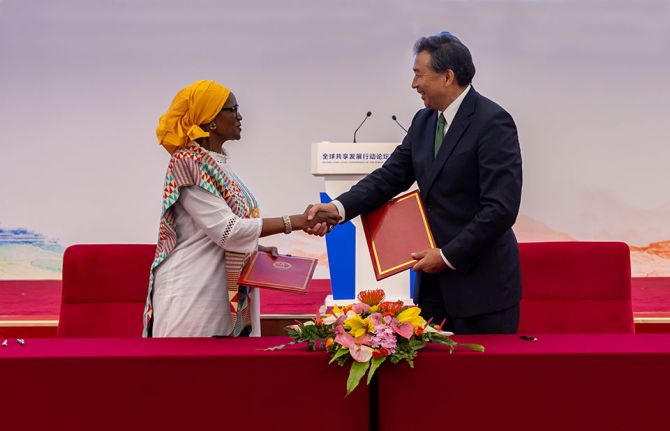
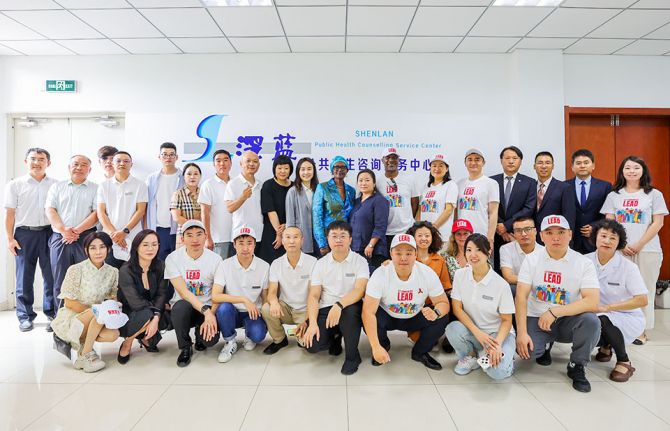
Press Release
UNAIDS and China sign two strategic agreements to advance the HIV response
15 July 2024 15 July 2024BEIJING, 15 July 2024 – The Joint United Nations Programme on HIV/AIDS (UNAIDS) and China signed two new Memoranda of Understanding (MOU) to advance joint strategic efforts to end AIDS in China and globally.
The first agreement was signed on 10 July by Wang Hesheng, Vice Minister of the National Health Commission and Administrator of the National Disease Control and Prevention Administration (NDCPA) and Winnie Byanyima, Executive Director of UNAIDS, in Beijing. UNAIDS and China have agreed to deepen their collaboration to reach the 2030 Sustainable Development Goals, within the context of China’s Global Development Initiative (GDI) and the Belt and Road Initiative (BRI). The agreement acknowledges China’s commitment to take a leadership role in the global HIV response including mobilizing partners and supporting efforts to end AIDS in middle- and lower-income countries.
Mr Wang thanked UNAIDS’ for technical support and guidance around China’s HIV response, particularly in formulating HIV response plans and strategies, monitoring and assessment, as well as UNAIDS’ data collection and analysis.
“We expect to continue and further our cooperation with UNAIDS with this MOU,” he said. “The first steps will be to boost communication and coordination, and actively participate in global health governance.”
According to the agreement, NDCPA will make an annual contribution of USD$1 million to UNAIDS from 2025 to 2029, totaling USD$5 million, which includes increased core funding.
The other agreement signed in Beijing on 13 July with the China International Development Cooperation Agency (CIDCA) addresses critical global development issues to achieve the Sustainable Development Goals (SDGs), which includes promoting health and ending AIDS globally, especially in other developing countries in Africa and Asia Pacific.
Luo Zhaohui, Chairman of the CIDCA recognizes UNAIDS’ leadership in the global HIV response and encouraged UNAIDS to apply for more Global Development and South-South Cooperation Fund (GDF) to address the HIV epidemic.
“Let’s work together to improve people’s health especially after the COVID-19 pandemic.” he said. "HIV is a new area for CIDCA but UNAIDS has a lot of experience so there is huge prospect to have more cooperation.”
As part of this agreement, UNAIDS and CIDCA will fund projects in developing partner countries through policy coordination, community engagement, capacity building and technical insight.
Since its founding in 2019, the CIDCA has provided steady financial support to UN agencies and developing member states. As highlighted at the annual Steering Committee of UNSDCF, 13 UN agencies mobilized more than US$ 100 million in South-South funding, predominantly from CIDCA, which assisted 85 partner countries in the areas of COVID response and resilience, social inclusion, agriculture, climate and energy efforts. Earlier this year, UNAIDS received the first GDF to support Iran’s upscaling of rapid HIV testing. UNAIDS is the second UN entity to sign a MOU with the CIDCA.
UNAIDS looks forward to deepening cooperation with China especially in South-South Cooperation and China-Africa cooperation in the areas of local drug production as well as supporting partner countries.
Ms Byanyima said, “Global South solidarity is the bedrock of the HIV response. It is only by standing together that we can end AIDS by 2030 and I welcome steps towards a deeper partnership building China and African countries.”
UNAIDS will also closely work with the African Union, the African Center for Disease Control and Prevention and the African Medicine Agency.
Ms Byanyima’s week-long mission to China is her first to the country since she became Executive Director of UNAIDS.
UNAIDS
The Joint United Nations Programme on HIV/AIDS (UNAIDS) leads and inspires the world to achieve its shared vision of zero new HIV infections, zero discrimination and zero AIDS-related deaths. UNAIDS unites the efforts of 11 UN organizations—UNHCR, UNICEF, WFP, UNDP, UNFPA, UNODC, UN Women, ILO, UNESCO, WHO and the World Bank—and works closely with global and national partners towards ending the AIDS epidemic by 2030 as part of the Sustainable Development Goals. Learn more at unaids.org and connect with us on Facebook, Twitter, Instagram and YouTube.
Region/country

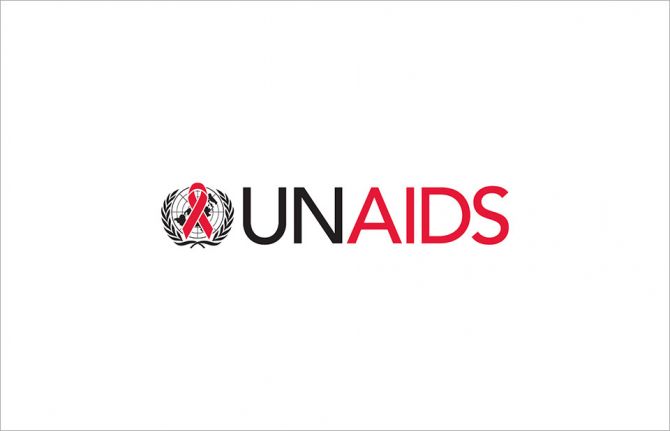
Press Release
New HIV drug can only offer hope of ending AIDS if all have access, UNAIDS says
10 July 2024 10 July 2024GENEVA, 10 July 2024— UNAIDS has welcomed the release of Gilead Sciences’ trial results on the injectable long-acting HIV medicine Lenacapavir for HIV prevention. The result “provides hope of accelerating efforts to end AIDS”, UNAIDS says, “but only if Gilead ensures that all people who need it can have access to this game-changing medicine.”
The recent trial of the medicine among cis-gender women in Uganda and South Africa was so successful that it was halted early. Twice-yearly injections of Lenacapavir showed overwhelming efficacy for preventing HIV infections compared to standard oral preventative HIV medicines, known as pre-exposure prophylaxis (PrEP). Additional trials are ongoing in Argentina, Brazil, Mexico, Peru, South Africa, Thailand and the United States.
UNAIDS has welcomed the “exciting development,” and urged the company to allow generic production of Lenacapavir to all low- and middle-income countries by negotiating voluntary licensing agreements through the Medicines Patent Pool (MPP). The MPP is a UN-backed programme with extensive experience negotiating generics agreements between originators and generic pharmaceutical companies.
Gilead has not yet announced its plans for low and middle-income countries. However, UNAIDS is concerned that Gilead’s latest statement regarding its access strategy for low and middle-income countries mentions only “high incidence countries and resource limited countries” and makes no specific mention of upper-middle-income countries or the Medicines Patent Pool. Upper middle-income countries account for 41% of new HIV infections and 37% of all people living with HIV. These countries are home to millions who cannot afford the prices Gilead charges high-income countries.
“The success of Gilead’s recent Lenacapavir trial is an exciting development. While we still await regulatory approvals, normative guidance and results from the other ongoing trials, this news offers hope that we can enable everyone who would benefit, including especially the most marginalised communities, to have access to the help they need. Enabling equitable global access to new technologies can help get the world on track to end AIDS as a public health threat by 2030,” said Winnie Byanyima, Executive Director of UNAIDS. "However, it is concerning that Gilead’s latest announcement seems to mention neither upper-middle income countries, where people cannot afford anything like Lenacapavir’s current $42,250 price tag, nor a commitment to work with the UN-backed Medicines Patent Pool. Without these safeguards, it cannot be assured that this game-changing medicine will reach all those who need it."
Notes
Data in this press release comes from UNAIDS 2023 Epidemiological estimates (aidsinfo.unaids.org)
The UNAIDS Executive Director joined more than 300 experts and activists calling for a generic version of Lenacapavir to be licensed to all low and middle-income countries through the MPP, in a letter coordinated by the People’s Medicines Alliance: https://peoplesmedicines.org/wp-content/uploads/2024/05/Gilead-Open-Letter_May-2024.pdf
The AIDS Vaccine Advocacy Coalition provides an overview of the Lenacapavir for PrEP trials: https://avac.org/resource/infographic/an-overview-of-lenacapavir-for-prep-trials/
UNAIDS
The Joint United Nations Programme on HIV/AIDS (UNAIDS) leads and inspires the world to achieve its shared vision of zero new HIV infections, zero discrimination and zero AIDS-related deaths. UNAIDS unites the efforts of 11 UN organizations—UNHCR, UNICEF, WFP, UNDP, UNFPA, UNODC, UN Women, ILO, UNESCO, WHO and the World Bank—and works closely with global and national partners towards ending the AIDS epidemic by 2030 as part of the Sustainable Development Goals. Learn more at unaids.org and connect with us on Facebook, Twitter, Instagram and YouTube.

Press Release
Governments, civil society and United Nations agencies join together to “accelerate and sustain” a resilient response to HIV
27 June 2024 27 June 2024GENEVA, 27 June 2024—At the 54th meeting of UNAIDS’ Programme Coordinating Board (PCB) which concluded today in Geneva, Switzerland, governments, civil society and United Nations agencies united in a shared commitment to accelerate progress to meet the 2025 AIDS targets and sustain the gains of the global HIV response toward 2030 and beyond.
In her opening remarks to the meeting, the Executive Director of UNAIDS, Winnie Byanyima, highlighted the urgency of accelerating progress to meet the 2030 target of ending AIDS as a public health threat. “The world has six years to reduce new HIV infection rates, expand antiretroviral treatment, and reduce AIDS-related deaths, but only 18 months to reach the 2025 targets which will determine whether or not countries will be able to end their pandemics by 2030.”
She warned that there was ‘nothing sustainable about an expanding pandemic’ and called on members to join UNAIDS in ‘throwing everything we can’ at HIV prevention, making medicines and health technologies for HIV prevention and treatment equitable, affordable and accessible, and building stronger health systems’.
“We have a choice,” said Ms Byanyima. “We can accelerate now, drive rates down, and succeed. Or we can get distracted, focus only on what we’ve gained so far, and miss the opportunity to end AIDS. We must accelerate in order to sustain.”
She noted that sustainability also requires progress on widening fiscal space and addressing indebtedness of low- and middle-income countries, protecting human rights and gender equality, and called on all partners and allies to embrace a ‘bold vision of sustainability—one capable of ending the AIDS pandemic.’
Ms Byanyima emphasised the funding constraints which are hampering progress in the AIDS response highlighting the US$ 8.5 billion shortfall in funding for HIV. In 2022, US$ 20.8 billion was available for HIV funding in low- and middle-income countries whereas the estimated need by 2025 is US$ 29.3 billion. She called on all donors to ensure that the Joint Programme is fully funded to the agreed minimum levels of US$ 160 million for 2024.
On the opening day of the meeting Germany announced that it would be increasing its funding to UNAIDS. “Germany has decided to increase its contribution to UNAIDS in 2024 by € 2 million, from € 4.75 million in 2023 to € 6.75 million. We trust that this decision shall contribute to the minimum budget requirements of US$ 160 million to ensure that UNAIDS can adequately implement its workplan and budget,” said Binod Mahanty, Senior Policy Advisor, Federal Ministry of Health of Germany.
The Board reviewed the performance of the Joint Programme and appreciated the wide scope and in-depth contribution of UNAIDS to the global AIDS response at the global, regional and country levels.
The critical role of communities in continuing to lead the way in responding to HIV was highlighted as central to sustainability of the HIV response, which was the focus of the thematic segment on the final day: Sustaining the gains of the global HIV response to 2030 and beyond.
Ms Byanyima said, “To end AIDS, the foundation must be people living with HIV, civil society and communities. They are indispensable and non-negotiable for ending the pandemic, sustaining the response and ensuring accountability for all.
Florence Riako Anam, Co-Executive Director of the Global Network of People Living with HIV (GNP+), gave a powerful keynote address during the thematic session, she said, “People living with HIV will be here in 2031. For us, the sustainability of the HIV response is a journey of transformation and not a destination with an end date.” Other keynote speakers included H.E. Edwin Dikoloti, Minister of Health of Botswana and the Former President of the Republic of Chile Michelle Bachelet.
Ahead of the PCB, building on its longstanding partnership with the Global Fund to Fight AIDS, TB and Malaria, UNAIDS signed a new strategic framework for cooperation and collaboration to end AIDS. Joining the PCB discussions the Director of the Global Fund, Peter Sands said, “Optimizing HIV and primary health care integration requires well-coordinated partnerships between governments, private sector companies, international organizations, and non-government organizations.”
John Nkengasong, U.S. Global AIDS Coordinator and head of PEPFAR, said that gains were fragile and need to be sustained. "2030 is critical because at that point the global community either says ‘we have done our best and we don’t know what else to do’ or do we say, ‘YES! we can get to the finish line’...2030 is a mountaintop moment.” He also called for UNAIDS to be fully funded to continue its life-saving work.
The Board meeting provided an opportunity for UNAIDS to announce a new high-level panel on a resilient and fit-for-purpose UNAIDS Joint Programme. The Panel will consider the evolution of the pandemic and the global response as well as the evolving country needs within the overall context of the Joint Programme’s mandate.
This week also saw the release of a new report by on Drug Use, Harm Reduction and the Right to Health, demonstrating the public health necessity of moving away from punitive approaches to people who use drugs – a step towards ensuring access to health care for marginalized communities.
The 54th PCB was chaired by Kenya, represented by Harry Kimtai, Principal Secretary, State Department for Medical Services, Nairobi, with Brazil serving as the Vice-Chair and Netherlands as Rapporteur. The Report to the Board by the UNAIDS Executive Director, and the reports for each agenda item and the PCB’s decisions can be found at: 54th UNAIDS Programme Coordinating Board.
The 55th meeting of the PCB will take place 10-12 December 2024, in Nairobi, Kenya.
UNAIDS
The Joint United Nations Programme on HIV/AIDS (UNAIDS) leads and inspires the world to achieve its shared vision of zero new HIV infections, zero discrimination and zero AIDS-related deaths. UNAIDS unites the efforts of 11 UN organizations—UNHCR, UNICEF, WFP, UNDP, UNFPA, UNODC, UN Women, ILO, UNESCO, WHO and the World Bank—and works closely with global and national partners towards ending the AIDS epidemic by 2030 as part of the Sustainable Development Goals. Learn more at unaids.org and connect with us on Facebook, Twitter, Instagram and YouTube.
